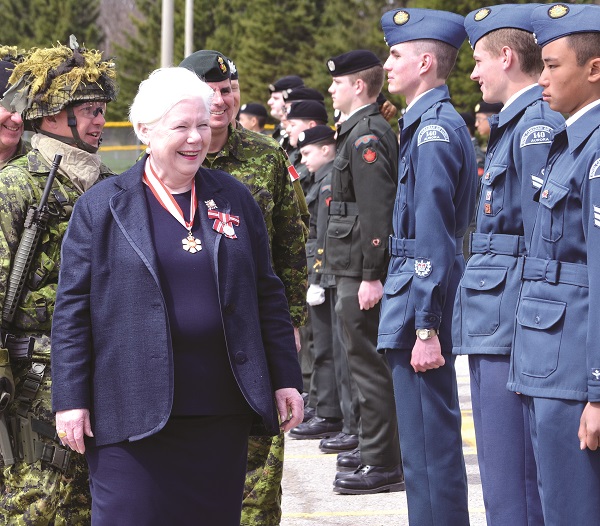General News » News
Halton to cherish people, memories of local regiment
April 27, 2016 · 0 Comments

By Brock Weir
Commanding a regiment is a lot like steering a ship for Lt. Col. Philip Halton.
Over the years – and indeed centuries – it has built up a lot of momentum on its own.
“It’s not like turning on a dime,” says Halton of his time as Commanding Officer of the Queen’s York Rangers.
But, as he hopped into his military vehicle on Sunday afternoon, the truck rapidly accelerated, and turned on that aforementioned dime before speeding towards the dais and grinding to a quick halt right in front of his family, who jumped in with him and sped off into the next adventure.
“It is an interesting feeling because I have gotten very use to just the rhythm and routine of service with the Rangers, and so has my family, but that routine is about to be upended,” he says, adding parading with the Regiment in Aurora and Toronto each Wednesday night has become “sacrosanct” for both him and his family.
But, now the Haltons are adjusting into a new routine. As they drove off the field behind the Ray Twinney Complex this past weekend in front of a host of dignitaries including Lieutenant-Governor Elizabeth Dowdeswell and Mayor Geoff Dawe, it was his final act as Commanding Officer of the local regiment.
The Lieutenant-Governor, as Colonel of the Regiment, was on hand to transfer command from Halton to Lieutenant-Colonel E.M. Thorson.
Speaking to The Auroran before the ceremony, Halton said the best advice he could give to his successor was to enjoy every moment at the helm because it goes by so quickly.
Halton’s role with the Queen’s York Rangers began four years ago.
As a child, the first seeds of a military life were sewn in him by his grandfather who regaled him with stories of “wild adventure” serving with the British Army in India and Burma during the Second World War. Charting a career of his own, the then-unilingual Anglophone jumped feet first into the French-speaking Royal Military College Saint-Jean.
“I knew one of the things that was valued in the Canadian Forces was bilingualism,” he explains. “I jumped in the deep end and did college in a French environment, which was great. It served me very well and in the years since then, I worked in West Africa and the Congo, and I am comfortable. It is a real boon to have that kind of skill in your back pocket.”
It served him well as a career soldier, serving as a full-time member of the Canadian Armed Forces for just over 11 years before transferring to the Reserves in 2003. Following the transfer, he worked in security for Scotiabank at the international level, business development or defence firms and is currently a consultant on defence and security – all the while balancing his duties as a Reservist with the Queen’s York Rangers.
“Things have changed with reservists,” says Halton of previous misconceptions that being a reservist was something of a hobby for those involved. “The state of readiness was low, the state of equipment was poor, and the reserves really existed to be called up in case of World War Three, but not for anything short of that. That really changed in the 1990s and particularly post 9/11 and the War in Afghanistan.
“Training dollars and equipment flowed into the units and suddenly there was a demand for reservists to participate in peacekeeping missions and in direct combat missions in Afghanistan. The purpose of the Reserves over that time really changed and even though we’re not in Afghanistan now, there is still the demand for reservists to assist with overseas operations, be it disaster relief in Nepal and the Philippines, the current mission in Iraq, or dealing with the current intake of Syrian refugees. All those things have required reservists and for us to do that our state of readiness has to be higher and it has become a much more serious business.”
As leader of the Queen’s York Rangers, he took part in their weekly training, dubbed ‘skills and drills’ as well as the behind-the-scenes work that keeps the Regiment functional. Over the past few years, the task of making sure they are in a constant state of readiness for deployment has been paramount, whether overseas or to places like Attawapiskat First Nation to tackle “natural and man-made disaster” and, in turn, being there to receive troops at the end of their operations and helping them re-integrate back into the normal life of the unit.
“It is everything all at once and the art is trying to manage to give everything the attention that it needs, given that this is one of those full-time part-time jobs,” he says, adding he is leaving the post heartened by the connections he has made with members of the Regiment past and present. “It is a very tight community and they are really some of the most remarkable people I have ever met, in the broadest sense.
“We’re citizen soldiers so even in the officers’ mess, we have lawyers, a judge, writers, novelists, farmers, there are all kinds of different people who in various spheres of their life excel. You would never get that group of people together in a room if not for the fact we also have this shared bond and we are all Rangers. I will carry them with me forever.”











